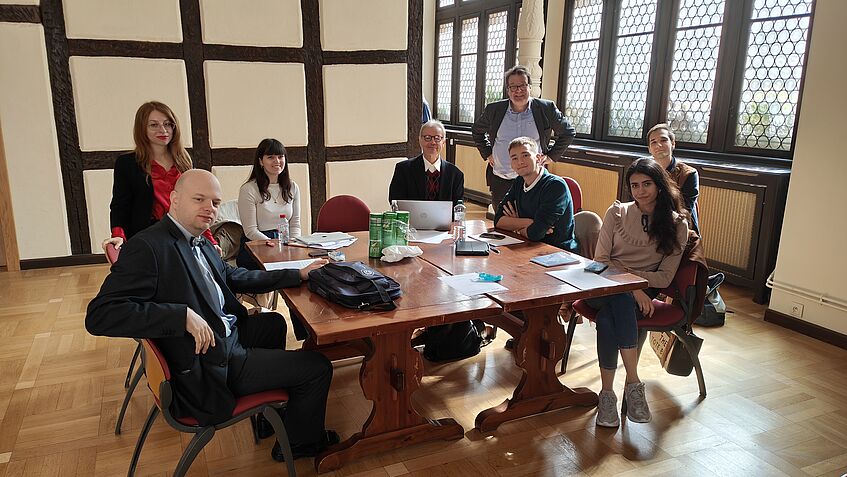Ius Commune Moot Court 2024: Student's Review

From September 12 to 17, 2024, the Faculty of Law at the University of Vienna held the Ius Commune moot court in the French city of Ensisheim.
Some students from the Masaryk University Faculty of Law were invited to participate and experience the hardship of working with historical documents, which can still, to this day, reveal to us how the law developed and how it became the complex system it is.
For five days, we had the rare opportunity to experience the lives of lawyers from the Middle Ages and the Early Modern period, aiming to gather as much evidence as possible and formulate arguments to support our final conclusions. The program began with initial welcoming lectures and debates on the importance of a proper understanding of the legal techniques used during that time in the Holy Roman Empire. The vastness of the Empire and its complicated division made the development of law even more complex, and the outcome is thousands of particular laws and an endless stream of cases.
During our time in Ensisheim, we had the chance to work with one such complicated case. The case itself concerned a legal process surrounding a feud between creditors and the son of the debtor in 18th-century Fürth. The inhabitants of this town were subject to the authority of three different overlordships, each of which was trying to pursue their own interests in their respective ways.
The complexity of the case cannot be overstated, as three different legal systems had to be taken into consideration during our proceedings, and most of the original documents were written in old German and Latin. These linguistic complications gave us the opportunity to work together and cooperate meaningfully. The chance to work on such a case with the assistance of experienced lawyers and legal historians is not always available; therefore, the outcome has an even greater impact.
Any questions that arose during the studies could have been quickly answered, as the teachers from both Brno and Vienna were always ready to help and guide us to our own discoveries about the Ius Commune and its specialties.
The selection of the hosting city was no coincidence, as it was made the capital of all possessions of Sigismund, the Emperor of the Holy Roman Empire, in the region of Upper Alsace. Although the city lost its political supremacy, its historical significance can still be strongly felt. To further enhance the historical atmosphere of our journey, we had the opportunity to work in the former city hall, the Palais de la Régence, which provided the perfect environment for our work. It also served as a courtroom for both the semifinals and finals of our competition.
The core of our work involved crafting arguments to advocate for both sides of the case. We were given access to a wealth of original legal sources, some of which were used in the original 18th-century case, while others provided further context for the legal questions we faced. This array of materials allowed us to grasp the multifaceted nature of the dispute.
To work on our objectives, we were divided into smaller groups and also had some time to acclimate to our new companions. We then conducted our individual research and tried to find connecting points that we could use as checkpoints on our way to creating a comprehensive response to the legal problems concerning our case from Fürth.
To understand the problems more clearly, we needed to get to the core of the situation itself. Fortunately, the present representatives from the Vienna Faculty of Law provided us with insight into the political and geographical context of the Holy Roman Empire, which had a direct impact on the development of its legal system. Many presentations and debates, during which we were able to express our opinions and views, helped us to get a clear picture of the situation in which our case was set.
From my personal perspective, the most valuable lesson we can take away from this intense and insightful Moot Court is the importance of paying attention to the smallest details, as they can significantly impact the outcome of a case. Moreover, the possibility of working together in one team with students from a different law school made us rethink the way we see law and helped us to think more openly about the case itself. Education in both schools differs, but through teamwork and our lingua franca, the English language, we have never failed to reach our objectives.
The final rounds of our competition took place on the last day of our stay in Ensisheim. First, we presented our pleadings concerning the case itself and also stated our arguments supporting either side of the dispute. The decision on who would represent which side was determined by flipping a coin at the start of the round.
After presenting our pleadings and arguments, we were asked by the court if we would like to raise a question against the opposition’s arguments. This part of the competition struck a spark, which ignited our already heated debate. All of the teams had to be stopped by the judges, as the arguments could have continued into the evening.
Altogether, our week in Ensisheim must be concluded as a success, as we all felt motivated by the fruits of our labor. Although the original case that we analyzed doesn’t have a solution, as it was never found, we analyzed every source available within the time frame, and the outcome is a substantial number of arguments and statements made by the students themselves. As we departed the town of Ensisheim, everyone felt motivated and understood why the study of legal history holds real significance in today’s practice.
Boris Šabík,
Student of the Faculty of Law, Masaryk University, Brno, Czech Republic.
E-mail: 546912@mail.muni.cz ORCID 0009-0005-2897-0804.
